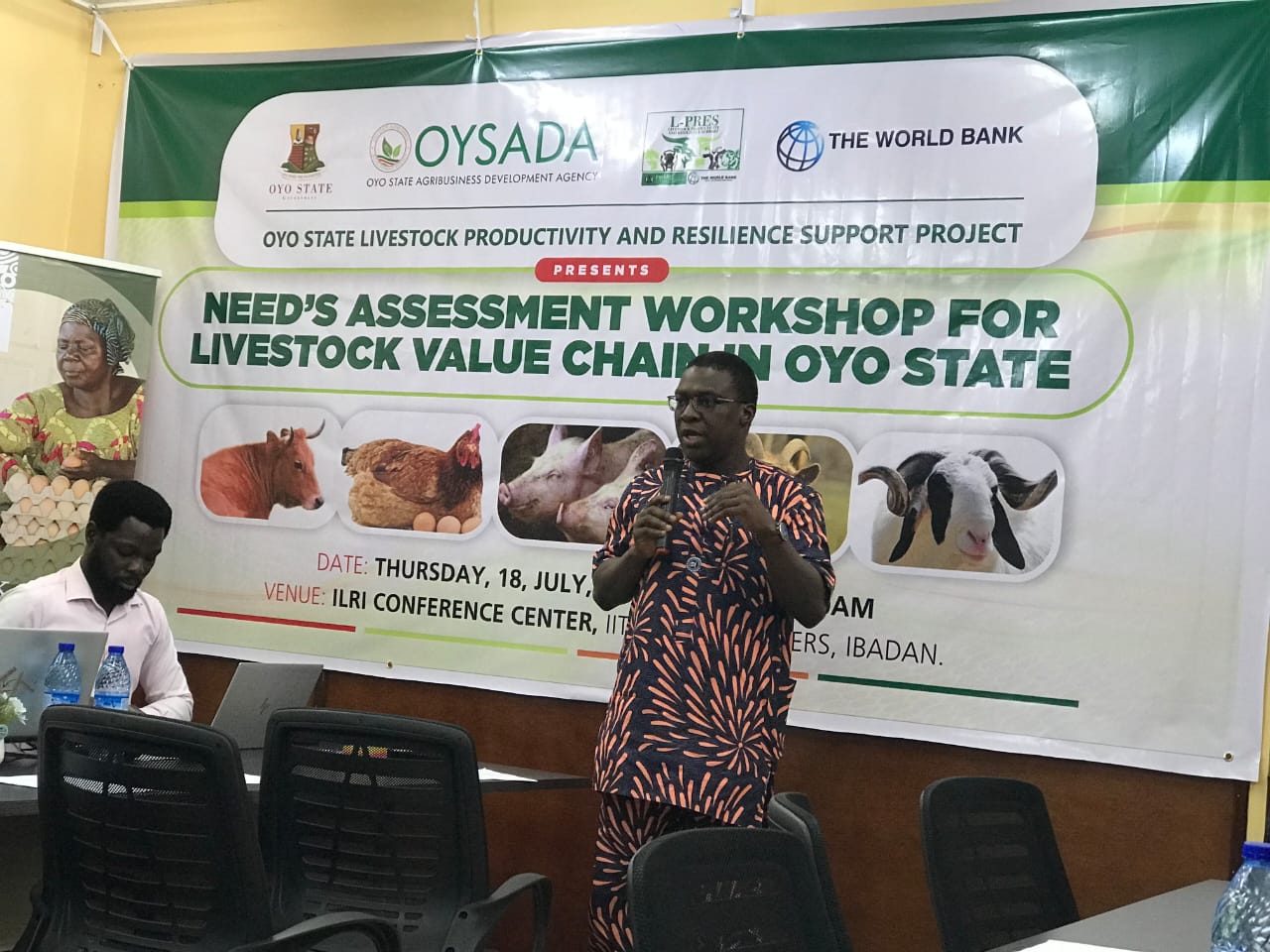Oyo To Witness Improved Livestock Production, As L-PRES, OYSADA Hold Needs Assessment Workshop At ILRI
•By Oyeniyi Awojoodu, Ibadan
IBADAN – The Oyo state government in its drive to improve the state’s livestock sector and support local dairy farmers, livestock breeders, and the entire value chain, the State Government, through its State Agribusiness Development Agency (OYSADA), is implementing the Livestock Productivity and Resilience Support project (L-PRES) in the state.
Oyo State Agribusiness Development Agency in conjunction with its technical partner, the International Livestock Research Institute (ILRI), recently host a workshop for stakeholders and professionals across the livestock value chain.
RELATED POSTS
AGRIBUSINESS:Oyo To Benefit From WATEA Programme, As Gov Makinde Receives French Delegation
The needs assessment workshop held at the ILRI Conference Center, IITA Ibadan, had in attendance all the stakeholders in livestock productions in the state. The workshop conducted a needs assessment for the various value chains, exploring the challenges and identifying appropriate interventions.
Speaking on the workshop’s significance, Dr. Debo Akande, Executive Adviser to the Oyo State Governor on Agribusiness and Chair of the state’s L-PRES Steering Committee, emphasized its alignment with the state’s overall agricultural strategy.
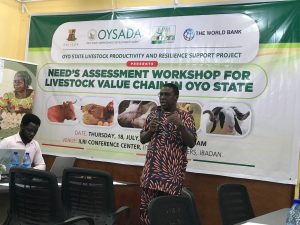
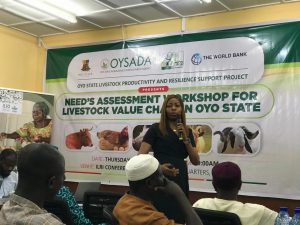
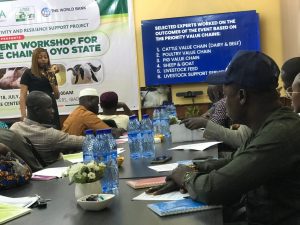
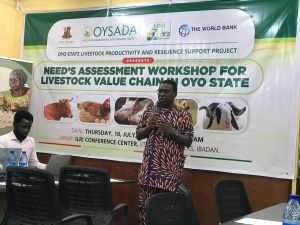
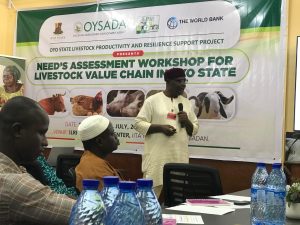
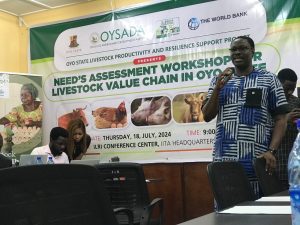
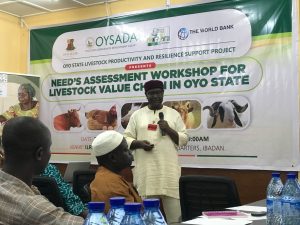
“The past focus has traditionally been on crops,” Dr. Akande acknowledged, “but livestock plays a vital role as well. Oyo State recognizes the interconnectedness of crops and livestock production.”
He elaborated on the workshop’s objectives. “This project is a comprehensive review of our current livestock practices, identifying areas for improvement across the entire value chain, from upstream breeding to downstream processing and everything in between,” Dr. Akande explained.
“There is immense potential for the state to benefit from all segments of the livestock value chain.”
ALSO READ
(PHOTOS): We’ll Make Oyo Modern Agribusiness Hub In Sub-Saharan Africa – Makinde
Dr. Akande, who also serves as Director General of OYSADA, further highlighted opportunities in processing livestock products. “Consider dairy production,” he said. “Milk can be processed into various products like yogurt and cheese, creating additional value.”
“The economic potential of the livestock sector is substantial,” Dr. Akande stressed. “It’s well-known that Oyo State boasts the largest Day Old Chick (DOC) production in West Africa. Many West African countries source their DOCs from Oyo State.”
“This project will support all stakeholders,” Dr. Akande concluded, “from smallholder farmers to large-scale investors in the livestock industry.”
Mr Kola Kazeem, the Oyo State Project Coordinator for L-PRES in his address at the workshop noted that the essence of the needs assessment workshop is to invite stakeholders to a round table, where they can proffer solutions on livestock issues that usually affect producers and other stakeholders in the sector.
He said, “To achieve success in any project, there is the need to have consultation with the people involved.
“Under L-PRES, the intention is to have those stakeholders, direct and indirect beneficiaries to come and discuss on solutions to the problems they’re facing on the job. We are well prepared and we are not joking with implementation of this project.
“One of the issues we have in the livestock sector is low productivity and most importantly, our farmers and producers do not have access to the market and lack of access to the market is preventing many of them in growing their businesses and as such, that is not helping productivity which in in turn is making so many people including our farmers to run away from livestock sector.
“Under the L-PRES project, we’re charged to address the issue of low productivity and low investment in the sector. Representatives from each livestock sector are present, so we are good to go.” Kazeem affirmed.
In a briefing with journalists following his presentation at a recent workshop, Dr. Tunde Amole, the Country Director for ILRI, highlighted Oyo State’s impressive performance in livestock production. Dr. Amole pointed to existing data indicating that the state boasts the largest Day Old Chicken (DOC) market in the country.
“There’s a Day Old Chicken market held twice a week in Ibadan, Oyo State’s capital city,” Dr. Amole explained.
He said, “Estimated data suggests that over 5 million DOCs are traded daily, translating to 10 million DOCs a week and a staggering 40 million DOCs in a month. This market attracts buyers and sellers from across West Africa.”
“The scale of Oyo State’s DOC market is just one indicator of the state’s thriving livestock sector,” Dr. Amole continued.
“The state’s diverse agro-ecology is well-suited for various livestock types, including pigs, poultry, dairy animals, goats, and more. Data confirms the presence of a vast market for livestock production in Oyo State.”
Dr. Amole further elaborated on the workshop’s objectives. “One key activity is profiling more farmers,” he said. “This includes biometric data collection and geo-referencing their locations. This will ensure government investments reach legitimate farmers actively involved in livestock production.”
He clarified the roles of different entities involved. “ILRI has a Memorandum of Understanding (MOU) with the Oyo State government, acting as the state’s technical consultant for all livestock projects,” Dr. Amole explained.
Amole further said that, “L-PRES, a World Bank project for Nigeria, provides loan support for livestock development. Participating states access these funds through the national coordinating office.”
RELATED NEWS
“Another crucial purpose of this workshop is to identify needs by bringing stakeholders together for open dialogue,” Dr. Amole concluded. “We anticipate a lasting positive impact on Oyo State and Nigeria as a whole within the next 2-3 years.” He said.

